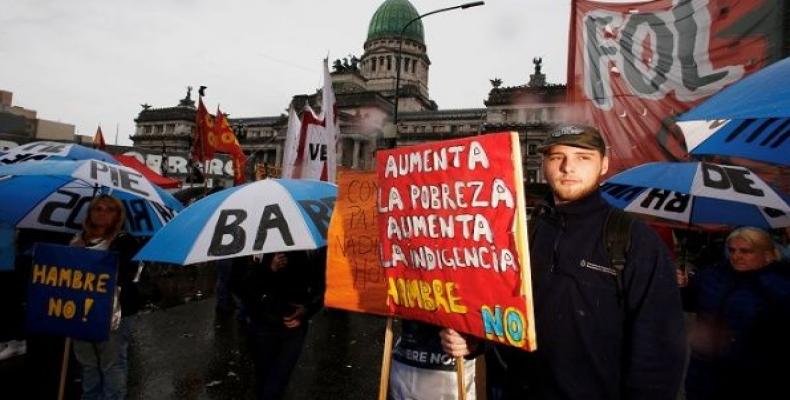Buenos Aires, November 6 (RHC)-- Since taking office in December 2015, Argentinean President Mauricio Macri has created $153.619 billion in combined national debt, 83.4 percent of which is in the form of high-interest bonds issued by the National Treasury.
In a study by Argentina’s External Debt Observatory of the Metropolitan University for Education and Labor (ODE-UMET), the country’s National Treasury has sold off over $128 billion in bonds, 78 percent of which was in foreign currency, mainly U.S. dollars.
The ODE-UMET says the national external debt (taking inflation into account) has been growing at a faster rate during the current Macri administration than during the seven years of the last military dictatorship – from 1976-1983. The observatory found that the annual external debt during the Macri presidency is increasing 155.6 percent faster per year than during the dictatorship.
UMET President Nicolas Trotta writes in the report: "Debt as the engine of economic sustainability is being exhausted. … Macri is leading us to an economic collapse and a probable cessation of payments. The debt is accelerating above the levels it adopted by the military civil dictatorship."
Despite promises by the government over the past two months, when inflation doubled and the peso value further tanked, that it would ease off on selling bonds, since September the Treasury has sold off billions of short-term, dollar-denominated notes. The report shows that these bonds are paid back within about 200 days at a 5-7 percent interest rate, but Reuters and Argentine media outlets indicate loan interest at 69-74 percent.
To cover the debt, Macri and his Finance Minister Nicolas Dujovne have negotiated an International Monetary Fund (IMF) loan that now totals $56.3 billion, $20.7 billion of which has already been dispersed with another $7.7 billion to be distributed on December 15th. The IMF loan has been the ire of millions of Argentineans who have taken to the streets to protest the government’s massive austerity measures to appease IMF officials.
President Macri and his Cambiemos party have also sold off over a trillion in Argentinean pesos hoping this would stabilize the currency but for months this hasn’t worked. The peso depreciated 0.20 percent to 35.59 on Monday.
Macri and Dujovne have each blamed the nation’s current economic recession and 40 percent inflation rate on previous administrations, but an expert in Argentina’s economy, Mark Weisbrot told teleSUR the downward spiral is due to “excessive, unnecessary foreign borrowing (and) super-high interest rates.”
Argentina’s “emerging” economy depends on international investors however the country’s JP Morgan risk index rating also rose four units to 613 points on Monday. Depending on outside investors to develop macroeconomic policies has resulted in slashing public subsidies and increasing the poverty rate to over 25 percent.
Right-wing Chilean President Sebastian Piñera said in an interview that Macri wasn’t able to fix the economic problems because he was making changes “too gradually.” Billionaire Piñera said he supported the recent swing to the right in the region saying "there will be more freedom, in Colombia, Argentina, Brazil.
Study shows Argentina's debt growing faster than during dictatorship

Related Articles
Commentaries
MAKE A COMMENT
All fields requiredMore Views
- Presidential candidate Luisa González commits to the right to education, health and social justice in Ecuador
- Cuba defends Africa-America shared future at UN Tourism Summit
- Cuban foreign minister arrives in Honduras for CELAC Summit
- Massive anti-Trump protests take to the streets across the United States
- Isla Verde Film and Environment Festival turns on projectors

